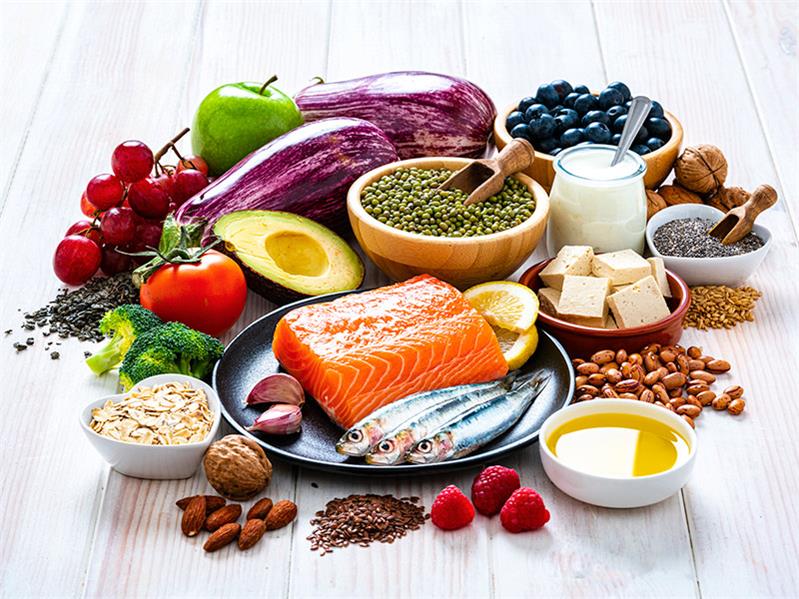Contents
- 1 The Wonder Nutrient: Omega-3 Fatty Acids
- 2 A Brief Overview of Omega-3s
- 3 The Importance of Omega-3s in the Body
- 4 What are Omega-3 Fatty Acids?
- 5 Types of Omega-3s (ALA, EPA, DHA)
- 6 Sources of Omega-3s (fish, nuts, seeds)
- 7 Health Benefits of Omega-3 Fatty Acids
- 8 How to Incorporate More Omega-3s into Your Diet
- 9 Potential Risks and Side Effects of Omega-3 Fatty Acids
- 10 Possible Interactions with Medications
- 11 Overconsumption Risks
- 12 Conclusion
The Wonder Nutrient: Omega-3 Fatty Acids
Omega-3 fatty acids are often referred to as the “wonder nutrient” by health experts and nutritionists due to their amazing health benefits. These healthy fats play a crucial role in maintaining overall good health, from cardiovascular function to brain development. Although they’re called “fats,” these nutrients are essential for a well-balanced diet and can help prevent numerous diseases.
A Brief Overview of Omega-3s
There are three different types of Omega-3 fatty acids: alpha-linolenic acid (ALA), eicosapentaenoic acid (EPA), and docosahexaenoic acid (DHA). ALA is mainly found in plant sources such as flaxseeds, chia seeds, walnuts, and soybeans.
EPA and DHA, on the other hand, are mostly found in fatty fish like salmon, mackerel, herring, and sardines. Omega-3s have been studied extensively for their significant role in reducing inflammation throughout the body.
Inflammation is linked to numerous chronic diseases such as heart disease, arthritis, cancer, diabetes, and stroke – just to name a few. By reducing inflammation levels with omega-3 intake we can reduce our risk of developing these diseases.
The Importance of Omega-3s in the Body
Our body cannot produce Omega-3 fatty acids on its own; hence it’s important that we consume them through our diet or supplements. These essential fats play an important role in several biological processes such as:
- Brain Health: Over 60% of our brain structure is composed of fats called lipids where DHA makes up a significant portion. Omega-3s are involved in the development and function of the brain, which is important for cognitive health.
- Cardiovascular Health: Omega-3s have been shown to improve heart health by reducing inflammation levels, lowering blood pressure and triglycerides, and preventing blood clots. Consuming high amounts of omega-3 fatty acids can help reduce the risk of heart disease.
- Pregnancy and Early Life: Omega-3s play an important role in fetal growth and development during pregnancy. Studies have also shown that consuming omega-3s while pregnant may increase intelligence levels in offspring.
It’s clear that Omega-3 fatty acids are essential for our overall well-being. In the upcoming sections of this article, we will explore each type of Omega-3 fatty acid in depth along with their sources and benefits.
What are Omega-3 Fatty Acids?
You might have heard the term “omega-3s” before, but what exactly are they? In simple terms, omega-3 fatty acids are a type of polyunsaturated fat that is essential for human health. Unlike saturated and trans fats, which can be harmful when consumed in excess, omega-3s provide numerous health benefits.
The chemical structure of omega-3 fatty acids is what sets them apart from other types of fat. At the most basic level, an omega-3 fatty acid molecule consists of a chain of carbon atoms with a carboxyl group at one end and a methyl group at the other.
The key difference between omega-3s and other types of fat is the placement of double bonds within this carbon chain. There are three main types of omega-3 fatty acids that are important for human health: alpha-linolenic acid (ALA), eicosapentaenoic acid (EPA), and docosahexaenoic acid (DHA).
ALA is found in plant-based sources such as flaxseed oil, chia seeds, and walnuts. EPA and DHA are primarily found in fish and seafood.
Types of Omega-3s (ALA, EPA, DHA)
While all three types of omega-3 fatty acids have health benefits, they each play different roles in the body. ALA is considered an essential fatty acid because it cannot be produced by the body and must be obtained through diet or supplements.
Once consumed, some ALA can be converted into EPA and DHA in the body. EPA and DHA have been more extensively studied than ALA for their health benefits.
They are particularly important for heart health because they can help lower triglycerides (a type of blood fat) as well as reduce inflammation throughout the body. DHA is also important for brain function and development, especially in infants and young children.
Sources of Omega-3s (fish, nuts, seeds)
For most people, the best dietary sources of EPA and DHA are fatty fish like salmon, tuna, and mackerel. It is recommended that individuals consume at least two servings of fatty fish per week to obtain sufficient amounts of omega-3s.
It’s important to choose wild-caught fish whenever possible, as farm-raised fish may have lower levels of omega-3s. For vegetarians and vegans who don’t eat fish, there are still options for obtaining omega-3s.
Flaxseed oil is a good source of ALA, which can be converted into EPA and DHA in the body. Other plant-based sources of ALA include chia seeds, hemp seeds, and walnuts.
However, it’s worth noting that the conversion rate from ALA to EPA/DHA is relatively low in most people. Therefore, it may be necessary to supplement with algae-based supplements if you don’t eat fish or seafood regularly.
Health Benefits of Omega-3 Fatty Acids
Cardiovascular Health: Lowering Blood Pressure and Triglycerides
One of the most notable health benefits of Omega-3 fatty acids is their ability to promote cardiovascular health. Studies have shown that regular consumption of Omega-3s can help lower blood pressure and triglyceride levels in the body. This is important because high blood pressure and triglycerides are both major risk factors for heart disease, which is the leading cause of death worldwide.
In addition, Omega-3s have been shown to improve overall heart function by reducing inflammation in the arteries, which can decrease the risk of developing atherosclerosis (hardening and narrowing of the arteries). This means that incorporating more foods rich in Omega-3s into your diet can potentially help you maintain a healthy heart.
Preventing Blood Clots and Reducing Inflammation
Another way that Omega-3 fatty acids support cardiovascular health is by preventing blood clots from forming inside blood vessels. When blood clots form in your veins or arteries, it can lead to serious conditions such as stroke or heart attack.
By thinning your blood, these essential fatty acids reduce your risk for such complications. The reduction in inflammation that comes with consuming enough omega 3’s has also been linked with a decreased risk for cardiac arrhythmias (irregular heartbeat) and helps protect against plaque buildup on arterial walls.
Brain Health: Enhancing Cognitive Function & Reducing Depression & Anxiety Risk
Omega-3 fatty acids are not just good for our hearts; they’re also great for our brains! These essential fats play an important role in brain function, including memory recall, problem-solving skills, and cognitive performance. Research has shown that increasing omega-3 intake might lower age-related cognitive decline and improve overall mood by reducing feelings of anxiety.
And it’s not just in older adults that Omega-3s show a positive effect on the brain. In children and young adults, adding Omega-3 supplements to their diet improved academic performance and behavior.
Omega 3’s are an important nutrient for growing brains, too! In fact, low levels of omega-3s have been linked with an increased risk of developing depression and anxiety later in life.
Preventing Alzheimer’s Disease
Alzheimer’s disease is a neurological condition that affects millions of people worldwide and is characterized by memory loss, cognitive decline, and behavioral changes. Research has shown that incorporating more Omega-3 fatty acids into your diet may help reduce your risk of developing Alzheimer’s disease.
One study found that individuals who consumed high amounts of fish (a primary source of EPA & DHA omega 3 fatty acids) had a 60% lower risk for Alzheimer’s than those who rarely ate fish. Another study showed that people with higher levels of DHA were less likely to develop dementia over time compared to those with lower levels.
Overall, the benefits associated with including more omega-3s in your diet include improved heart health as well as better cognitive function and mental well-being. It’s clear from these findings why it’s crucial to ensure you’re getting enough omega-3s each day!
How to Incorporate More Omega-3s into Your Diet
Now that we’ve covered the importance of Omega-3 fatty acids and their health benefits, you may be wondering how to incorporate more of these essential nutrients into your diet. The good news is that there are many delicious and healthy foods that are rich in Omega-3s.
Eating more fish (salmon, tuna)
Fish is one of the best sources of Omega-3 fatty acids. Specifically, fatty fish like salmon and tuna contain high amounts of EPA and DHA, two types of Omega-3s that have been shown to have the most health benefits. Incorporating more fish into your diet can be as simple as eating it for dinner a few times a week.
Try making baked salmon with lemon and herbs or grilling up some fresh tuna steaks. If you’re not a fan of fishy tastes or smells, try adding canned salmon or tuna to salads or sandwiches for a quick and easy lunch option.
Choosing wild-caught over farm-raised fish
When selecting fish for your meals, it’s important to choose wisely. While both wild-caught and farm-raised fish can contain Omega-3s, wild-caught varieties tend to have higher amounts due to their natural diet. Farm-raised fish are often fed pellets made from corn or soy, which do not contain the same levels of nutrients as the natural diet of wild-caught fish.
Additionally, farm-raised varieties may contain higher levels of contaminants like mercury or PCBs. To ensure you’re getting the most Omega-3s from your fish selection as well as minimizing any potential risks associated with contaminants, opt for wild-caught varieties whenever possible.
Alternatives for vegetarians/vegans (flaxseed oil, chia seeds)
For those who do not consume fish or other animal products, there are still plenty of options for incorporating Omega-3s into your diet. Flaxseed oil is an excellent source of the plant-based Omega-3 known as ALA.
Simply drizzle it over salads or mix it into smoothies for a quick and easy nutrient boost. Chia seeds are another great alternative.
These tiny superfoods contain high levels of both ALA and fiber, making them a filling and healthy addition to oatmeal, yogurt, or baked goods. By incorporating these simple tips and foods into your daily routine, you can ensure that you’re getting the essential Omega-3 fatty acids your body needs to thrive.
Potential Risks and Side Effects of Omega-3 Fatty Acids
While Omega-3 fatty acids have numerous health benefits, it is important to note that there are also potential risks and side effects associated with consuming too much of them. One potential risk is bleeding, as Omega-3s can affect blood clotting. Therefore, people who are taking blood thinners or have a bleeding disorder should consult with their doctor before taking Omega-3 supplements or consuming high amounts of Omega-3-rich foods.
Another possible side effect is gastrointestinal discomfort, such as nausea or diarrhea. This is more common in people who take high doses of fish oil supplements.
To avoid this discomfort, it may be helpful to start with a smaller dose and gradually increase the amount over time. Additionally, some studies have suggested that high doses of Omega-3s may increase the risk of prostate cancer in men.
However, other studies have found no association between Omega-3 consumption and prostate cancer risk. More research is needed to fully understand this potential risk.
Possible Interactions with Medications
Omega-3 fatty acids can interact with certain medications, so it’s important to talk to your doctor before taking any supplements if you’re on prescription medications. Specifically, Omega-3s can enhance the effects of blood-thinning medications like aspirin or warfarin. This can increase the risk of bleeding and other complications.
In addition, some cholesterol-lowering medications may interact with Omega-3 supplements by increasing the levels of LDL cholesterol (the “bad” cholesterol) in some people. However, this interaction seems to be rare and more research is needed to fully understand how different medications may interact with Omega-3s.
Overconsumption Risks
While consuming adequate amounts of Omega-3s can provide numerous health benefits, overconsumption can lead to negative effects. One potential risk of overconsuming Omega-3s is an increased risk of bleeding, as mentioned previously. Another potential risk is oxidative stress, which occurs when there are too many free radicals in the body.
Additionally, consuming high amounts of Omega-3s can lead to an imbalance between Omega-3 and Omega-6 fatty acids in the body. This imbalance can lead to inflammation and other negative health effects.
To avoid overconsuming Omega-3s, it’s recommended that adults consume no more than 3 grams of combined EPA and DHA per day from supplements. It’s also important to talk to a healthcare provider before starting any new supplement regimen, especially if you are pregnant or have a history of bleeding disorders or other health conditions.
Conclusion
Omega-3 Fatty Acids are essential for maintaining good health and preventing chronic diseases. They offer a wide range of benefits, from improving heart health to boosting brain function and reducing inflammation. By incorporating Omega-3-rich foods into your diet, you can achieve optimal health and wellness.
To recap, there are three main types of Omega-3s: ALA, EPA, and DHA. ALA is found in plant-based sources such as flaxseed oil and chia seeds while EPA and DHA are typically found in fatty fish like salmon and tuna.
It’s important to choose wild-caught fish over farm-raised to avoid consuming potentially harmful chemicals. If you’re vegetarian or vegan, there are still plenty of options for getting your recommended daily dose of Omega-3s.
Consider incorporating plant-based sources such as nuts and seeds into your diet or taking a vegan-friendly supplement. Overall, the benefits of Omega-3 Fatty Acids cannot be overstated.
By making small adjustments to your diet and lifestyle habits, you can experience the numerous health benefits that come with these essential nutrients. So go ahead – add some salmon to your dinner plate or sprinkle some chia seeds on your morning oatmeal – your body will thank you!












